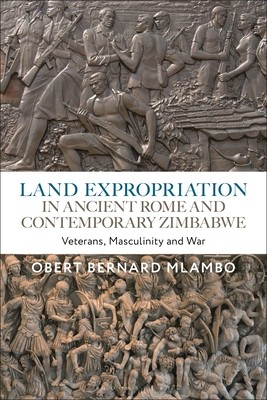
- We will send in 10–14 business days.
- Author: Obert Bernard Mlambo
- Publisher: Bloomsbury Academic
- ISBN-10: 1350291897
- ISBN-13: 9781350291898
- Format: 15.6 x 23.4 x 1.4 cm, minkšti viršeliai
- Language: English
- SAVE -10% with code: EXTRA
Land Expropriation in Ancient Rome and Contemporary Zimbabwe (e-book) (used book) | bookbook.eu
Reviews
Description
In this highly original book, Obert Bernard Mlambo offers a comparative and critical examination of the relationship between military veterans and land expropriation in the client-army of the first-century BC Roman Republic and veterans of the Zimbabwean liberation war. The study centres on the body of the soldier, the cultural production of images and representations of gender which advance theoretical discussions around war, masculinity and violence. Mlambo employs a transcultural comparative approach based on a persistent factor found in both societies: land expropriation. Often articulated in a framework of patriarchy, land appropriation takes place in the context of war-shaped masculinities.
This book fosters a deeper understanding of social processes, adding an important new perspective to the study of military violence, and paying attention to veterans' claims for rewards and compensation. These claims are developed in the context of war and its direct consequences, namely expropriation, confiscation and violence. Land Expropriation in Ancient Rome and Contemporary Zimbabwe contributes to current efforts to decolonise knowledge construction by revealing that a non-Western perspective can broaden our understanding of veterans, war, violence, land and gender in classical culture.EXTRA 10 % discount with code: EXTRA
The promotion ends in 24d.00:28:04
The discount code is valid when purchasing from 10 €. Discounts do not stack.
- Author: Obert Bernard Mlambo
- Publisher: Bloomsbury Academic
- ISBN-10: 1350291897
- ISBN-13: 9781350291898
- Format: 15.6 x 23.4 x 1.4 cm, minkšti viršeliai
- Language: English English
In this highly original book, Obert Bernard Mlambo offers a comparative and critical examination of the relationship between military veterans and land expropriation in the client-army of the first-century BC Roman Republic and veterans of the Zimbabwean liberation war. The study centres on the body of the soldier, the cultural production of images and representations of gender which advance theoretical discussions around war, masculinity and violence. Mlambo employs a transcultural comparative approach based on a persistent factor found in both societies: land expropriation. Often articulated in a framework of patriarchy, land appropriation takes place in the context of war-shaped masculinities.
This book fosters a deeper understanding of social processes, adding an important new perspective to the study of military violence, and paying attention to veterans' claims for rewards and compensation. These claims are developed in the context of war and its direct consequences, namely expropriation, confiscation and violence. Land Expropriation in Ancient Rome and Contemporary Zimbabwe contributes to current efforts to decolonise knowledge construction by revealing that a non-Western perspective can broaden our understanding of veterans, war, violence, land and gender in classical culture.

Reviews